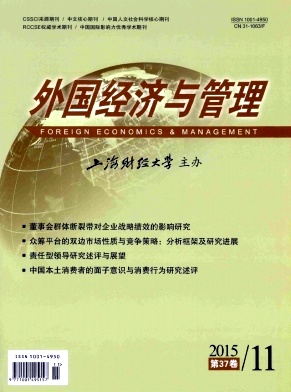中国本土消费者的面子意识与消费行为研究述评
外国经济与管理 2015 年 第 37 卷第 11 期, 页码:63 - 71
摘要
参考文献
摘要
面子是千百年来中国人最重视的文化价值观之一。当下有关面子与消费的研究逐渐兴起,被作为本土消费者行为研究的一个有力的切入点。面子作为一种符号资本,其在消费社会中的重要性不言而喻。对中国消费者面子与消费行为的研究,有助于发现和理解当下中国消费者的消费认同特征和消费追求的符号意涵。本文对消费者的面子做出了释义,以"心理—行为"思路从消费者的面子来源和认知、面子消费的动机和决策、面子对消费行为的影响三个方面总结了研究现状,并指出了现有研究的局限。在未来的研究中,消费者面子的内涵、面子的形成机制、面子与文化消费行为的关系值得深入探讨。
[1] Bao Y,Zhou K Z and Su C. Face consciousness and risk aversion:Do they affect consumer decision making?[J]. Psycho-logy & Marketing,2003,20(8):733-755.
[2] Belk R W and Pollay R W. Materialism and status appeals in Japanese and US print advertising[J]. International Marke-ting Review,1985,2(4):38-47.
[3] Belk R W. Possessions and the extended self[J]. Journal of Consumer Research,1988,15(2):139-168.
[4] Goffman E. On face-work:An analysis of ritual elements in social interaction[J]. Psychiatry:Journal for the Study of Interpersonal Processes,1955,18(3):213-231.
[5] Ho D Y. On the concept of face[J]. American Journal of Sociology,1974,81(4):867-884.
[6] Hu H C. The Chinese concepts of "face"[J]. American Anthropologist,1944,46(1):45-64.
[7] Hoare R J,Butcher K and O'Brien D. Understanding Chinese diners in an overseas context:A cultural perspective[J]. Journal of Hospitality & Tourism Research,2011,35(3):358-380.
[8] Le Monkhouse L,Barnes B R and Stephan U. The influence of face and group orientation on the perception of luxury goods:A four market study of East Asian consumers[J]. International Marketing Review,2012,29(6):647-672.
[9] Li J J and Su C. How face influences consumption:A comparative study of American and Chinese consumers[J]. International Journal of Market Research,2007,49(2):237-256.
[10] Liao J and Wang L. Face as a mediator of the relationship between material value and brand consciousness[J]. Psycho-logy & Marketing,2009,26(11):987-1001.
[11] Lin L,Xi D and Lueptow R M. Public face and private thrift in Chinese consumer behaviour[J]. International Journal of Consumer Studies,2013,37(5):538-545.
[12] Liu F and Murphy J. A qualitative study of Chinese wine consumption and purchasing:Implications for Australian wines[J]. International Journal of Wine Business Research,2007,19(2):98-113.
[13] Shi Z,Furukawa I,Jin C,et al. Chinese face:MIANZI and LIAN and their influence on Chinese consumer behavior[R]. Proceedings of 2nd International Symposium on Information Engineering and Electronic Commerce,2010:252-256.
[14] Somogyi S,Li E,Johnson T,et al. The underlying motivations of Chinese wine consumer behaviour[J]. Asia Pacific Journal of Marketing and Logistics,2011,23(4):473-485.
[15] Wan L C. Culture's impact on consumer complaining responses to embarrassing service failure[J]. Journal of Business Research,2013,66(3):298-305.
[16] Wong N Y and Ahuvia A C. Personal taste and family face:Luxury consumption in Confucian and Western societies[J]. Psychology and Marketing,1998,15(5):423-441.
[17] Zhou N and Belk R W. Chinese consumer readings of global and local advertising appeals[J]. Journal of Advertising,2004,33(3):63-76.
[18] 杜建刚. 服务消费中的面子建构研究[J]. 山西财经大学学报,2011,33(9):57-64.
[19] 杜建刚,范秀成. 服务失败情境下面子丢失对顾客抱怨倾向的影响[J]. 管理评论,2012,24(3):91-99.
[20] 姜彩芬.面子与消费[M]. 北京:社会科学文献出版社,2009.
[21] 卢泰宏等. 中国消费者行为报告[M]. 北京:中国社会科学出版社,2005.
[22] 李东进,吴波,武瑞娟. 中国消费者购买意向模型——对Fishbein合理行为模型的修正[J]. 管理世界,2009(1):121-129.
[23] 戚海风. 中国人消费行为中的面子问题探索[J]. 湖北大学学报(哲学社会科学版),2009,36(1):120-125.
[24] 施卓敏,范丽洁,叶锦锋. 中国人的脸面观及其对消费者解读奢侈品广告的影响研究[J]. 南开管理评论,2012,15(1):151-160.
[25] 施卓敏,曹妙琴. 面子意识对中产阶层奢侈品购买行为的影响研究[J]. 南方经济,2013(3):62-74.
[26] 宋晓兵. 消费者感知面子的形成机理及其对购买意向的影响研究[M]. 北京:知识产权出版社,2012.
[27] 王长征,崔楠. 个性消费还是地位消费——中国人的"面子"如何影响象征型的消费者—品牌关系[J].经济管理,2011,33(6):84-90.
[28] 王长征,周学春,黄敏学. "求同"与"存异":面子如何抑制或促进消费者的独特性需求[J]. 营销科学学报,2012,8(4):18-34.
[29] 王勇. 面子对中国消费者购物行为的影响[J]. 西安交通大学学报(社会科学版),2014,34(1):49-53.
[30] 汪涛,张琴. 为什么消费者会感觉到有面子?——消费者面子及其感知机制研究[J]. 经济管理,2011,33(7):78-88.
[31] 薛海波,符国群,江晓东. 面子意识与消费者购物决策风格:一项70后、80后和90后的代际调节作用研究[J]. 商业经济与管理,2014(6):65-75.
[32] 袁少锋,高英,郑玉香. 面子意识、地位消费倾向与炫耀性消费行为——理论关系模型及实证检验[J]. 财经论丛,2009(5):81-86.
[33] 杨燕青. 消费者的面子观对品牌消费行为的影响:性别的调节作用[D]. 上海交通大学,2013.
[34] 张正林,庄贵军. 基于社会影响和面子视角的冲动购买研究[J]. 管理科学,2008,21(6):66-72.
[35] 郑玉香. 我国大学生面子消费决策行为特点的探索性研究[J]. 经济问题探索,2009(2):55-60.
[36] 郑玉香,袁少锋. 中国消费者炫耀性购买行为的特征与形成机理——基于参照群体视角的探索性实证研究[J]. 经济经纬,2009(2):115-119.
[37] 翟学伟. 中国人的脸面观——形式主义的心理动因与社会表征[M]. 北京:北京大学出版社,2011.
[38] 翟学伟. 人情、面子与权力的再生产[M]. 北京:北京大学出版社,2013.
[2] Belk R W and Pollay R W. Materialism and status appeals in Japanese and US print advertising[J]. International Marke-ting Review,1985,2(4):38-47.
[3] Belk R W. Possessions and the extended self[J]. Journal of Consumer Research,1988,15(2):139-168.
[4] Goffman E. On face-work:An analysis of ritual elements in social interaction[J]. Psychiatry:Journal for the Study of Interpersonal Processes,1955,18(3):213-231.
[5] Ho D Y. On the concept of face[J]. American Journal of Sociology,1974,81(4):867-884.
[6] Hu H C. The Chinese concepts of "face"[J]. American Anthropologist,1944,46(1):45-64.
[7] Hoare R J,Butcher K and O'Brien D. Understanding Chinese diners in an overseas context:A cultural perspective[J]. Journal of Hospitality & Tourism Research,2011,35(3):358-380.
[8] Le Monkhouse L,Barnes B R and Stephan U. The influence of face and group orientation on the perception of luxury goods:A four market study of East Asian consumers[J]. International Marketing Review,2012,29(6):647-672.
[9] Li J J and Su C. How face influences consumption:A comparative study of American and Chinese consumers[J]. International Journal of Market Research,2007,49(2):237-256.
[10] Liao J and Wang L. Face as a mediator of the relationship between material value and brand consciousness[J]. Psycho-logy & Marketing,2009,26(11):987-1001.
[11] Lin L,Xi D and Lueptow R M. Public face and private thrift in Chinese consumer behaviour[J]. International Journal of Consumer Studies,2013,37(5):538-545.
[12] Liu F and Murphy J. A qualitative study of Chinese wine consumption and purchasing:Implications for Australian wines[J]. International Journal of Wine Business Research,2007,19(2):98-113.
[13] Shi Z,Furukawa I,Jin C,et al. Chinese face:MIANZI and LIAN and their influence on Chinese consumer behavior[R]. Proceedings of 2nd International Symposium on Information Engineering and Electronic Commerce,2010:252-256.
[14] Somogyi S,Li E,Johnson T,et al. The underlying motivations of Chinese wine consumer behaviour[J]. Asia Pacific Journal of Marketing and Logistics,2011,23(4):473-485.
[15] Wan L C. Culture's impact on consumer complaining responses to embarrassing service failure[J]. Journal of Business Research,2013,66(3):298-305.
[16] Wong N Y and Ahuvia A C. Personal taste and family face:Luxury consumption in Confucian and Western societies[J]. Psychology and Marketing,1998,15(5):423-441.
[17] Zhou N and Belk R W. Chinese consumer readings of global and local advertising appeals[J]. Journal of Advertising,2004,33(3):63-76.
[18] 杜建刚. 服务消费中的面子建构研究[J]. 山西财经大学学报,2011,33(9):57-64.
[19] 杜建刚,范秀成. 服务失败情境下面子丢失对顾客抱怨倾向的影响[J]. 管理评论,2012,24(3):91-99.
[20] 姜彩芬.面子与消费[M]. 北京:社会科学文献出版社,2009.
[21] 卢泰宏等. 中国消费者行为报告[M]. 北京:中国社会科学出版社,2005.
[22] 李东进,吴波,武瑞娟. 中国消费者购买意向模型——对Fishbein合理行为模型的修正[J]. 管理世界,2009(1):121-129.
[23] 戚海风. 中国人消费行为中的面子问题探索[J]. 湖北大学学报(哲学社会科学版),2009,36(1):120-125.
[24] 施卓敏,范丽洁,叶锦锋. 中国人的脸面观及其对消费者解读奢侈品广告的影响研究[J]. 南开管理评论,2012,15(1):151-160.
[25] 施卓敏,曹妙琴. 面子意识对中产阶层奢侈品购买行为的影响研究[J]. 南方经济,2013(3):62-74.
[26] 宋晓兵. 消费者感知面子的形成机理及其对购买意向的影响研究[M]. 北京:知识产权出版社,2012.
[27] 王长征,崔楠. 个性消费还是地位消费——中国人的"面子"如何影响象征型的消费者—品牌关系[J].经济管理,2011,33(6):84-90.
[28] 王长征,周学春,黄敏学. "求同"与"存异":面子如何抑制或促进消费者的独特性需求[J]. 营销科学学报,2012,8(4):18-34.
[29] 王勇. 面子对中国消费者购物行为的影响[J]. 西安交通大学学报(社会科学版),2014,34(1):49-53.
[30] 汪涛,张琴. 为什么消费者会感觉到有面子?——消费者面子及其感知机制研究[J]. 经济管理,2011,33(7):78-88.
[31] 薛海波,符国群,江晓东. 面子意识与消费者购物决策风格:一项70后、80后和90后的代际调节作用研究[J]. 商业经济与管理,2014(6):65-75.
[32] 袁少锋,高英,郑玉香. 面子意识、地位消费倾向与炫耀性消费行为——理论关系模型及实证检验[J]. 财经论丛,2009(5):81-86.
[33] 杨燕青. 消费者的面子观对品牌消费行为的影响:性别的调节作用[D]. 上海交通大学,2013.
[34] 张正林,庄贵军. 基于社会影响和面子视角的冲动购买研究[J]. 管理科学,2008,21(6):66-72.
[35] 郑玉香. 我国大学生面子消费决策行为特点的探索性研究[J]. 经济问题探索,2009(2):55-60.
[36] 郑玉香,袁少锋. 中国消费者炫耀性购买行为的特征与形成机理——基于参照群体视角的探索性实证研究[J]. 经济经纬,2009(2):115-119.
[37] 翟学伟. 中国人的脸面观——形式主义的心理动因与社会表征[M]. 北京:北京大学出版社,2011.
[38] 翟学伟. 人情、面子与权力的再生产[M]. 北京:北京大学出版社,2013.
引用本文
郭晓琳, 林德荣. 中国本土消费者的面子意识与消费行为研究述评[J]. 外国经济与管理, 2015, 37(11): 63–71.
导出参考文献,格式为:
上一篇:组织异议研究述评与展望
下一篇:直觉型决策研究现状和展望





 8111
8111  0
0

